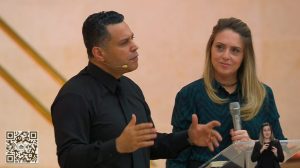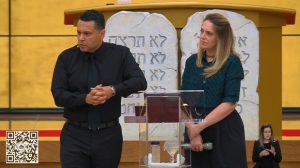Schedule | - 2:25 pm
At the Love Therapy, Both Couples and Singles Discovered How Their Approach to Money Directly Impacts Their Love Lives

With faith and clarity, the Love Therapy meeting held this Thursday, May 15th, focused on one of the most utilized—yet often misunderstood—tools in relationships: money. The discussion emphasized that money is not just a means of payment; it serves as an extension of each person’s personality, responsibility, and even spirituality.
“You should write this down because it will be on the test: money is a faithful expression of your personality, responsibility, and spirituality,” stated Bishop Renato Cardoso. This message attracted couples and singles eager to understand why financial matters are among the leading causes of marital crises.
 Many people fail to realize that a couple’s bank balance can act as a thermometer for their marriage. “Do you want to know how your relationship is doing? Look at your statements. Whether the amount is small or large, it reveals the quality of your marriage,” explained the bishop.
Many people fail to realize that a couple’s bank balance can act as a thermometer for their marriage. “Do you want to know how your relationship is doing? Look at your statements. Whether the amount is small or large, it reveals the quality of your marriage,” explained the bishop.
The meeting highlighted that it is no coincidence that in a divorce, assets are often divided—usually in half. This commonplace procedure reflects the deep connection between marriage and money. Ignoring this connection can lead to both financial and marital difficulties.
In today’s modern world, we rarely see physical money; it’s often just a number in a banking app—which is rooted in trust. The same principle applies to relationships: where there is no trust, there tends to be secrecy about income and expenses, leading to estrangement and suspicion regarding the future of the marriage.
The way a couple views and uses money exposes the most intimate aspects of their dynamics. For instance, someone who is impulsive may spend without thinking. On the other hand, a prudent person prefers to save and carefully consider expenses. This difference can create friction, as opposites attract—but can also struggle to understand one another.
 “You might think you’re arguing over money, but in reality, you’re arguing over personality,” Cristiane Cardoso pointed out. Couples need to realize that these differences don’t imply that one person is right and the other wrong. Instead, these variances can complement each other when managed well.
“You might think you’re arguing over money, but in reality, you’re arguing over personality,” Cristiane Cardoso pointed out. Couples need to realize that these differences don’t imply that one person is right and the other wrong. Instead, these variances can complement each other when managed well.
An impulsive person might be an excellent entrepreneur, driving action, while a prudent person provides organization, balance, and planning. Instead of trying to change each other, couples should learn to collaborate, playing to one another’s strengths within the “marriage team.”
Another point emphasized was the imbalance created by very emotional personalities. Those who are overly eager to please may help friends and relatives financially despite lacking the means to do so, which can lead to debt and marital conflict. Conversely, those who are overly rational risk being seen as insensitive, prioritizing logic above all else. “God gave us balance,” cautioned the bishop. Couples must listen to each other, acknowledge their differences, and learn from one another.
The second pillar discussed was responsibility. Marriages often struggle when one or both partners behave irresponsibly with finances. Many couples face challenges when they overlook their shared commitments, such as bills, rent, and other living expenses.
Responsible individuals recognize that every dollar spent or saved has a purpose. This maturity positively influences not only their financial situation but also fosters respect and unity in relationships.
Finally, the lecture underscored that money also reflects an individual’s spirituality. How someone manages material possessions indicates who holds the highest place in their heart.
 “There are people who claim to love God, but they trust money more than the Word. This person may not realize they are worshiping money instead of the Lord,” warned the bishop. When a couple prioritizes their spiritual life, everything begins to fall into place: they experience peace, make wise decisions, and achieve financial balance. If money takes precedence over God, their relationship may become materialistic, hollow, and fraught with conflict.
“There are people who claim to love God, but they trust money more than the Word. This person may not realize they are worshiping money instead of the Lord,” warned the bishop. When a couple prioritizes their spiritual life, everything begins to fall into place: they experience peace, make wise decisions, and achieve financial balance. If money takes precedence over God, their relationship may become materialistic, hollow, and fraught with conflict.
The Bible teaches, “For where your treasure is, there your heart will be also.” (Matthew 6:21) If a couple’s heart prioritizes and focuses on God, money will serve as a tool for blessing, not division.
How you handle money isn’t merely a mathematical issue; it’s a reflection of personality, character, and a relationship health thermometer. Thus, learning to navigate this tool wisely can save your relationship and elevate it to new heights. To build a solid love life, begin with faith, open dialogue, and financial responsibility.
The Love Therapy meetings are aimed at helping those who want to learn to love intelligently, overcome past traumas, and build a relationship blessed by God. They occur every Thursday at 7 PM at select locations of The Universal Church. Please call 1-888-332-4141 or visit The Universal Church for more information.
Love Therapy meetings directly from the Temple of Solomon are available on Univer Video.